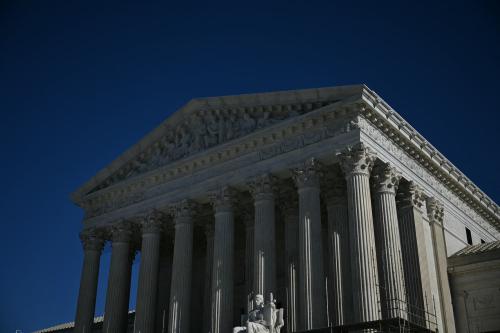Young Americans can play an important role in deciding the 2008 election. We are more interested in politics, more likely to register and vote, still undecided, and can make a difference. For candidates to win our votes they must address issues with which we are concerned: education and our economic future, the war in Iraq and religious extremism, and the environment and climate change. Sixty-three percent of young people think volunteerism is an effective way to solve our country’s problems – probably the 63% of us most likely to vote. Incentivizing service by offering educational grants in return for service, whether it is in Americorp, Peace Corps, or the military, addresses our concerns and will win our votes.
Incentivizing service is politically viable. Like the bipartisan welfare reform of 1996 this program is not a government handout, rather it rewards work or, to paraphrase President Clinton, “makes service pay.”
To be sure, increasing incentives would encourage people to join the military but more young people joining the military might relieve the need to lower recruitment standards and better prepare our country for a situation that requires force.
Offering those who volunteer educational grants will make a college education easier to obtain and in turn improve our economic prospects. The American economy is changing. Wages have stagnated for the less educated. From 1991 to 2005 the earnings of men with high school diplomas rose only six-tenths of one percent. Individuals with only a high school diploma earn about half as much money annually as do college graduates and are 3 times more likely to be in poverty. Young Americans worry about maintaining and improving our lifestyle for which a college education is no longer a luxury but a necessity. A program that increases access to college will brighten our economic futures and win our votes.
But education is not the only way to improve our economic prospects. In an increasingly global economy, international experience is increasingly necessary. Incentivizing service will add to the number of young Americans who serve their country outside its borders. As David J. Skorton, President of Cornell University, testified to Congress, if America wants to be a leader in the global economy, “we must instill an international perspective in all our students.” Encouraging young people to obtain these experiences, and rewarding us with increased access to higher education, will prepare us to succeed in the modern economy. The prospect of better preparation to excel in the emerging economy will get us to the polls.
In addition to the American economy, young people are concerned with the war in Iraq, terrorism, and the role America’s military plays in the world. As a group we are more internationally oriented than any past generation – one out of five young Americans has at least one parent born outside the U.S. However, we are likely to believe that America relies too heavily on its military power to ensure peace. A recent study found that humanitarian assistance builds “goodwill toward the United States and [erodes] support for global terrorists.” If one considers our international orientation combined with the type of action we believe will work, it follows that incentivizing us to serve abroad in a humanitarian capacity will satisfy our desire to engage the global community constructively, which in turn will win our votes.
In addition to the state of the economy and U.S. foreign policy, young Americans are concerned with the environment. Three-quarters of us agree with the statement, “Global warming is real and a growing threat.” Imagine a generation of Americans from the South Side of Chicago who teach best farming practices in West Africa or from Orange County who educate people about water conservation in India. Challenging us to solve the problems we care about, while opening doors for a more secure and prosperous future is a winning strategy for any candidate.
Most importantly, service appeals to the same sense of duty that gets young Americans to the polls on the first Tuesday following the first Monday of every other November.
Young Americas are increasingly likely to participate in politics and recent elections have been decided by the slimmest of margins. When we go to the polls in November, a secure economic future, a sound strategy to engage the world, and an opportunity to protect the environment, will determine which candidate we support. The issues young Americans care about are pressing issues for our country. Ultimately, incentivizing service can be a powerful tool to address these issues. If candidates choose not to address these issues they do so at our country’s peril. If candidates choose not to court young Americans’ votes they do so at their own peril.
The Brookings Institution is committed to quality, independence, and impact.
We are supported by a diverse array of funders. In line with our values and policies, each Brookings publication represents the sole views of its author(s).



Commentary
Op-edService with a Smile… and a Vote
January 9, 2008